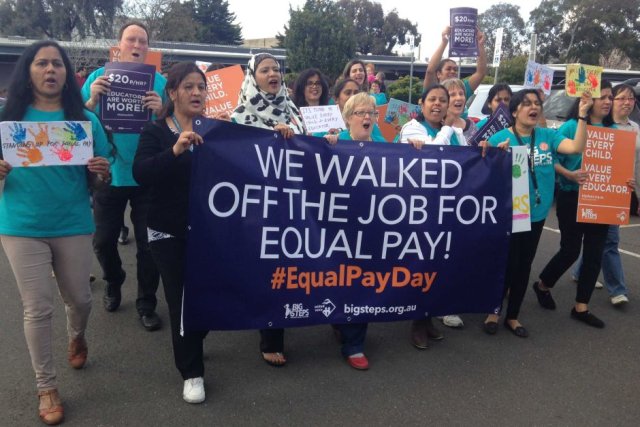
On September 8 about 100 childcare workers stopped work across Melbourne to call for equal pay and recognition for their work.
A number of childcare centres, including Dawson St Child Care Co-operative, Monash Community Family Co-operative, Monash Children’s Centre, Monash Caulfied Childcare Centre and East Brunswick Kindergarten and Childcare Centre, closed at 3pm, affecting about 500 children.
This was the first time in 30 years that early childhood educators had walked off the job and comes after a concerted national campaign led by the childcare workers’ union United Voice.
The union has also initiated a landmark case to be heard by the Fair Work Commission, citing the outdated view that still links childcare to “women’s work in the home”. The campaign included petitions, rallies and childcare workers chaining themselves to Prime Minister Malcolm Turnbull’s office.
Early childhood sector workers are paid as little as $20 an hour, which is slightly over the minimum wage but means early childhood educators are some of the lowest paid professionals in Australia, earning one-third less than educators of children just a few years older.
Childcare workers hold certificates, diplomas and degrees and are demanding the same wages as men in equivalent careers. The campaign’s call for a substantial hourly pay rise would go some way to not only bridge the gender pay gap overall, but also recognise the work of early childhood educators.
The childcare workers action coincided with Equal Pay Day, which recognised that it takes 69 days for women to catch up to men in average annual wage terms. According to the Workplace Gender Equality Agency report released in March, the national gender pay gap stands at 16.6% and has floated between 15 and 19% in the past two decades.
The gender pay gap translates to women being worse off at every stage of their life, including into retirement, where more than a third of single women will retire in poverty. Women are currently earning an average of $261.10 a week less than men while they spend twice as much time doing unpaid work.
About 95% of early childhood educators are women, showing how the issue of pay and the broader gendered division of care work are inextricably linked. Childcare is one of the feminised industries referred to as the “caring professions”, which includes nursing, teaching and social work. These professions consistently attract lower wages than male-dominated industries.
The feminised industries, linked to what traditionally has been seen as women’s work, remain underpaid and undervalued. While family obligations can interrupt careers, providing affordable and accessible childcare with educators who are paid adequately for their labour is important in achieving a workforce that provides a level playing field for women.
The ongoing disparity in pay along gendered lines will continue until the structural inequality of unpaid caring work, lack of childcare and unequal pay are adequately redressed.
Jo-anne Schofield, United Voice’s national secretary said the decision to close several centres and strike was “strong action, but justified”. The union has also declared the strike a glimpse of things to come, with more walkouts expected if the pay issue remains unresolved.
Like the article? Subscribe to Green Left now! You can also like us on Facebook and follow us on Twitter.